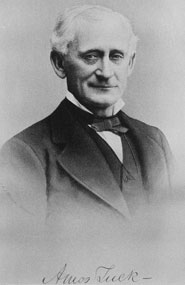- Amos Tuck
Infobox Congressman
name =Amos Tuck

state =New Hampshire
district =1st
term_start =March 4 ,1847
term_end =March 3 ,1853
preceded =None
succeeded =George W. Kittredge
birth_date =August 2 ,1810
birth_place =Parsonsfield, Maine
death_date =December 11 ,1879
death_place =Exeter, New Hampshire
nationality =
party =Independent
Free Soil
Whig
otherparty =
spouse =
relations =
children =
residence =
alma_mater =Dartmouth College
occupation =
profession =
religion =
website =
footnotes =Amos Tuck (1810-1879) was a political figure in
New Hampshire , credited by some New Hampshire sources as a founder of the Republican Party.Early life and education
Born in Parsonsfield,
Maine ,August 2 ,1810 , the son ofJohn Tuck , a sixth generation descendant ofRobert Tuck , a founder of Hampton and Winnacunnet, New Hampshire, in 1638.Amos Tuck attended
Effingham Academy andHampton Academy and graduated fromDartmouth College inHanover, New Hampshire in 1835; he studied law and entered the bar. He married Davida Nudd and had a son,Edward Tuck , on August 25, 1842, and a daughter,Ellen Tuck French , who married into the British peerage.Professional life
In his youth Amos Tuck came to Hampton and from 1836 to 1838 was Headmaster of the Hampton Academy founded by his ancestors. He was admitted to the bar in 1838 and commenced practice in Exeter. He later became a trustee of Dartmouth College. After leaving politics, Tuck was commissioned as a Naval officer of the port of
Boston 1861-1865; following theAmerican Civil War , he resumed the practice of law and also engaged in railroad building, at which he gained significant success and wealth.Political career
Tuck was elected to the State house of representatives in 1842 as a member of the Democratic Party but broke with pro-slavery Democratic leaders in 1844 and was formally cast out of the party. He ran for Congress, anyway, and was elected as an Independent to the Thirtieth Congress. In 1845 he called a convention to form an independent movement in favor of anti-slavery Congressional Candidate
John P. Hale . This convention would later be identified as "the nucleus of the Republican Party." During the months following the convention (which was described by Tuck as "respectable in numbers and unparalleled in spirit") Tuck worked tenaciously to grow his young party. His hard work and enthusiasm resulted in the successful election of Hale in 1846.Tuck himself ran as a
Free-Soil candidate to the Thirty-first Congress, and as a Whig to the Thirty-second Congress (March 4, 1847-March 3, 1853). After three consecutive terms he returned to Exeter in 1853 and began a movement to unite the many minor political factions that existed in the state of New Hampshire.Founder of the Republican Party in New Hampshire
held in Washington, D.C., in 1861 in an effort to devise means to prevent the impending war.
He was a personal friend of
Abraham Lincoln ,John Greenleaf Whittier and many other men prominent in his time, and is said to be responsible for putting Lincoln in office. "Lincoln...would never have realized his goals," according to Dartmouth historian Professor Frank Smallwood, "if his old friend, Amos Tuck of Exeter, New Hampshire...had not played such an influential role in helping him to secure the Republican party's presidential nomination in 1860."Retirement and legacy
Died in Exeter, N.H., December 11, 1879; interment in
Exeter Cemetery .His son,
Edward Tuck , financed and founded atDartmouth College the Amos Tuck School of Business Administration, as well as theTuck Historical Building , a beautiful granite structure inConcord, New Hampshire , home of theNew Hampshire Historical Society and itsTuck Library .Family and political descendants founded the
Amos Tuck Society to promote and spread the history of Tucks contributions and founding of the Republican Party.Descendants
Edward Tuck would also graduate from, and become a major donor to, Dartmouth College. He made his fortune in banking, railroads and international trade, becoming vice-consul to France.References
*Sewell, Richard H. "John P. Hale and the Politics of Abolition" (1965)
*Marston, Philip W. "Amos Tuck and the Beginning in New Hampshire of the Republican Party" Historical New Hampshire (1960)
*Corning, Charles R [obert] . [http://www.nh.gov/nhsl/nhbooks/amost.html "Amos Tuck"] . Exeter, N.H.: The News-letter Press, 1902.
*Dearborn, Jeremiah Wadleigh "Sketch of the life and character of Hon. Amos Tuck" read before the Maine Historical Society, December, 1888 . [Portland, Maine: Printed by B. Thurston & Co., 1888?]
*Gregg, Hugh. "Birth of the Republican Party : a summary of historical research on Amos Tuck and the birthplace of the Republican Party at Exeter, New Hampshire" . Compiled by Hugh Gregg and Georgi Hippauf. Nashua, N.H.: Resources of New Hampshire, 1995.References
* [http://www.infoplease.com/biography/us/congress/tuck-amos.html Infoplease Biographical Directory of the United States Congress, 1771-Present]
* [http://www.politicallibrary.org/AccessingtheCollectionsRevA/FindingGuides/AmosTuck71.pdf Accession of the Amos Tuck Society to the Political Library]
* [http://www.hampton.lib.nh.us/HAMPTON/history/1938/vinajones.htm "An old family of Hampton (the Tucks)"]
* [http://www.tuck.dartmouth.edu/about/history/index.html About Tuck - Our History]
* [http://www.politicallibrary.org/Birth.htm New Hampshire Political Library]
* [http://www.seacoastonline.com/2003news/exeter/10282003/news/57668.htm Seacoast Online "Republicans Party Down] October 28, 2003
Wikimedia Foundation. 2010.
